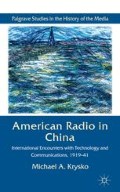Abstract
Jacob Schurman, the American Minister to China, was elated when the Federal Telegraph Company of California reached an agreement with the Chinese government in January 1921. This agreement provided for the first radiotelegraphy link between China and the United States. “In more than one direction the present personnel of the Chinese government is anxious for a close understanding with the United States,” Schurman reported to Washington. The contract proposed building five stations, the main one in Shanghai and four low power stations in Harbin, Beijing, Guangzhou, and Shanghai. The prospective stations promised to be “an important agency of cooperation between the two governments and peoples,” Schurman claimed. “From all aspects, political, military, and commercial” the ebullient Minister concluded, “the conclusion of this contract is a cause for greatest satisfaction.”1
Access this chapter
Tax calculation will be finalised at checkout
Purchases are for personal use only
Preview
Unable to display preview. Download preview PDF.
Notes
For Reinsch’s support of Federal see Reinsch to the Secretary of State Robert Lansing, 27 March 1919, 893.74/18, DSNA 1910–29. For background on Reinsch, see Warren Cohen, The Chinese Connection and American-East Asian Relations (New York: Columbia University Press, 1978), 301; Iriye, Across the Pacific, 133–4
James Reed, The Missionary Mind and American East Asia Policy, 1911–1915 (Cambridge, MA: Harvard University Press, 1983), 49, 50, 88.
Quote is from Paul Reinsch, An American Diplomat in China ( Garden City, NY: Doubleday, Page, and Company, 1922; reprinted, Taipei: Ch’eng-wen Publishing Company, 1967 ), 80.
On the Open Door see Hunt, The Making of a Special Relationship; Paul A. Varg, The Making of a Myth: The United States and China, 1897–1912 ( Westport, CT: Greenwood Press, 1968 )
Marilyn B. Young, The Rhetoric of Empire: American China Policy, 1895–1901 ( Cambridge, MA: Harvard University Press, 1968 )
Thomas J. McCormick, China Market: America’s Quest for Informal Empire, 1893–1901 ( Chicago: Quadrangle Books, 1967 ).
For the Warlord Era, see Hsi-Sheng Ch’i, Warlord Politics in China, 1916–1928 (Stanford, CA.: Stanford University Press, 1976 ).
For Schwerin’s background, see Hugh Aitken, The Continuous Wave: Technology and American Radio, 1900–1932 ( Princeton, NJ: Princeton University Press, 1985 ), 294–9
E. Mowbray Tate, Transpacific Steam: The Story of Steam Navigation from the Pacific Coast of North America to the Far East and the Antipodes, 1867–1941 ( New York: Cornwall Books, 1986 ), 253–5
Michael J. Hogan, Informal Entente: The Private Structure of Cooperation in Anglo-American Economic Diplomacy, 1918–1928 (Columbia: University of Missouri Press, 1977), 129–58; Aitken, Continuous Wave, 492
Daniel Headrick, The Invisible Weapon: Telecommunications and International Politics, 1851–1945 (New York: Oxford University Press, 1991), 188. See also “Old Cable Deals in China Recalled,” in the New York Times, 19 August 1928, 41.
Akira Iriye, After Imperialism: The Search for a New Order in the Far East, 1921–1931, 2nd ed. ( Chicago: Imprint Publications, 1990 ), 17–19
Arthur Waldron, From War to Nationalism: China’s Turning Point, 1924–1925 ( New York: Cambridge University Press, 1995 ), 163.
Jonathan Spence, The Search for Modern China, 2nd ed. ( New York: W.W. Norton, 1999 ), 322–3
Karen Garner, Precious Fire: Maud Russell and the Chinese Revolution (Amherst: University of Massachusetts Press, 2003), 68–70. Thorburn’s quote is from pages 69–70 of the Garner book.
Author information
Authors and Affiliations
Copyright information
© 2011 Michael A. Krysko
About this chapter
Cite this chapter
Krysko, M.A. (2011). “We Owe Nothing to Their Sensibilities”: Federal Telegraph, the Open Door, and the Washington System in 1920s China. In: American Radio in China. Palgrave Studies in the History of the Media. Palgrave Macmillan, London. https://doi.org/10.1057/9780230301931_2
Download citation
DOI: https://doi.org/10.1057/9780230301931_2
Publisher Name: Palgrave Macmillan, London
Print ISBN: 978-1-349-32230-5
Online ISBN: 978-0-230-30193-1
eBook Packages: Palgrave History CollectionHistory (R0)

